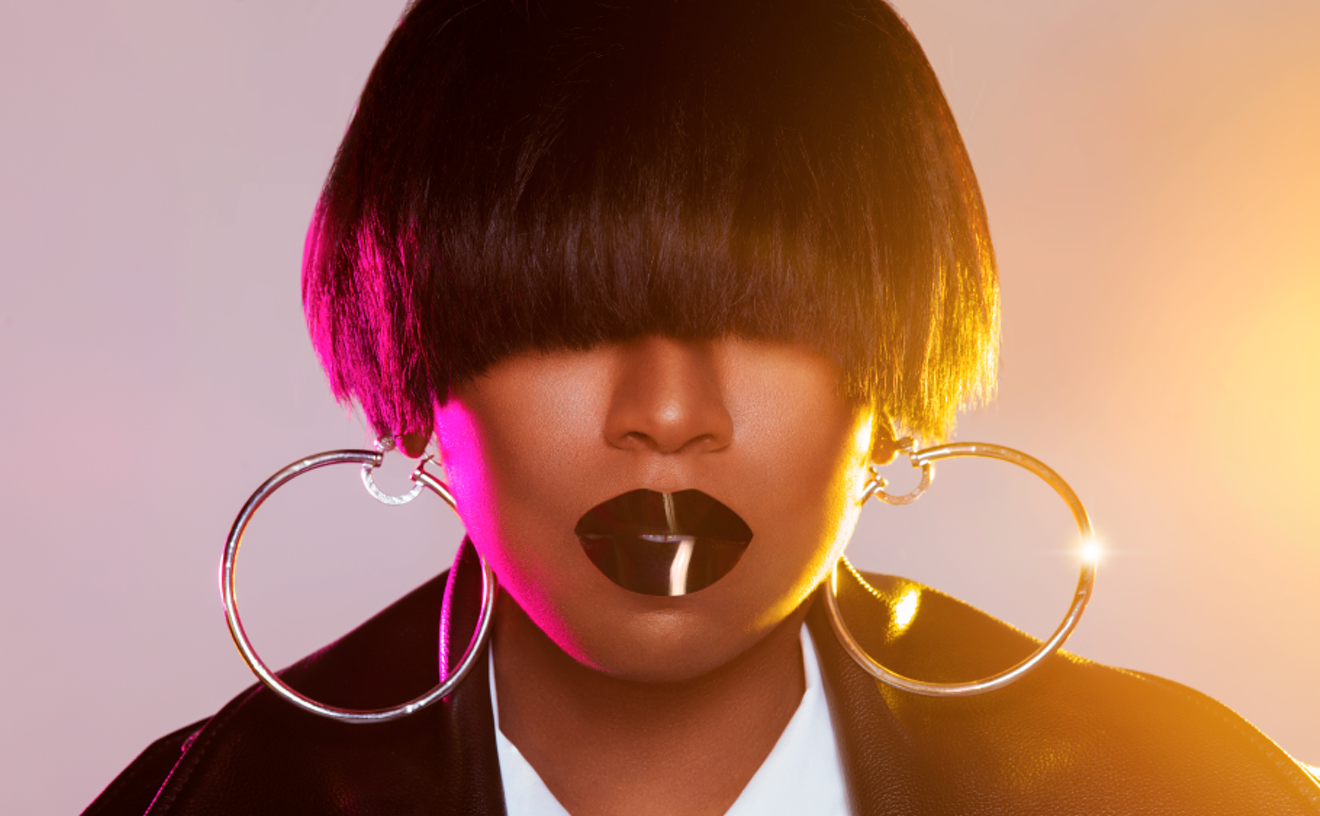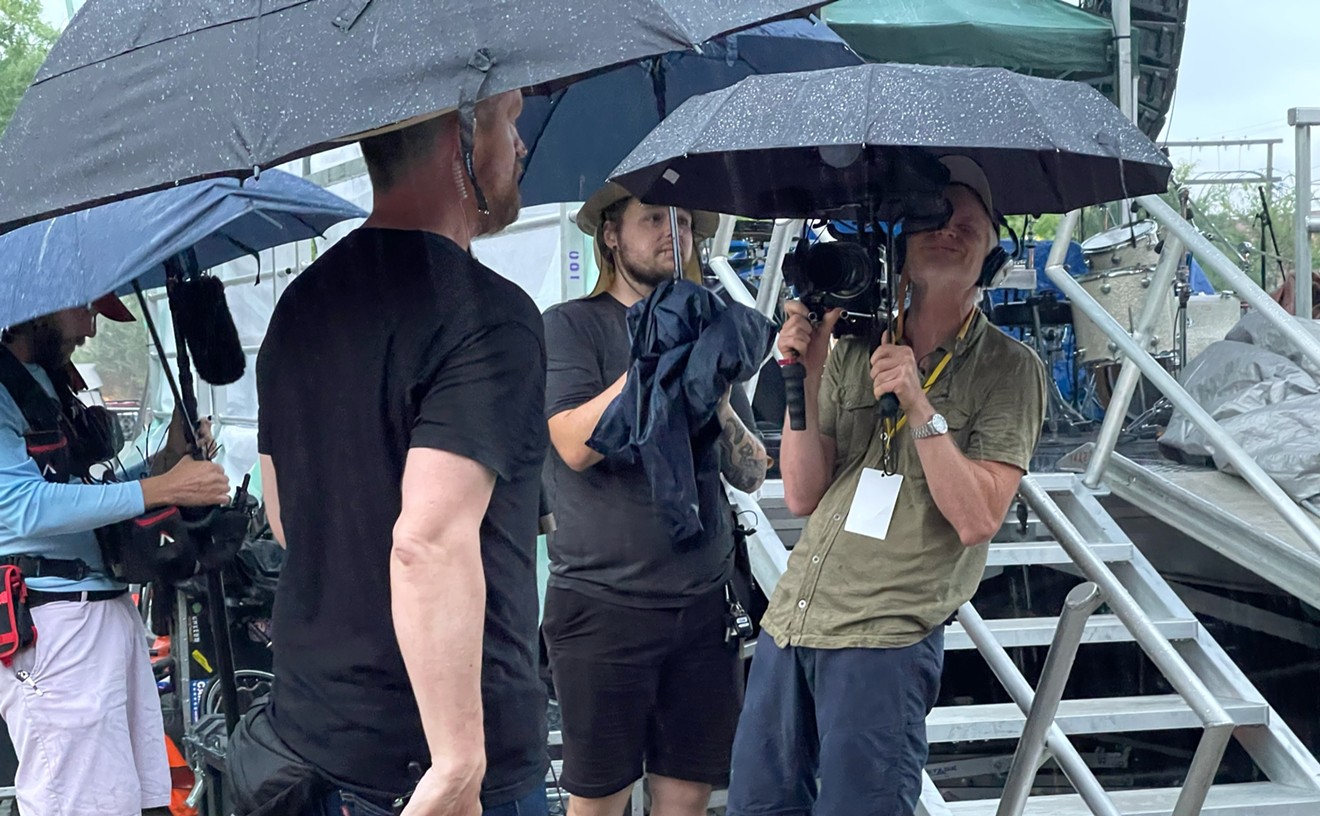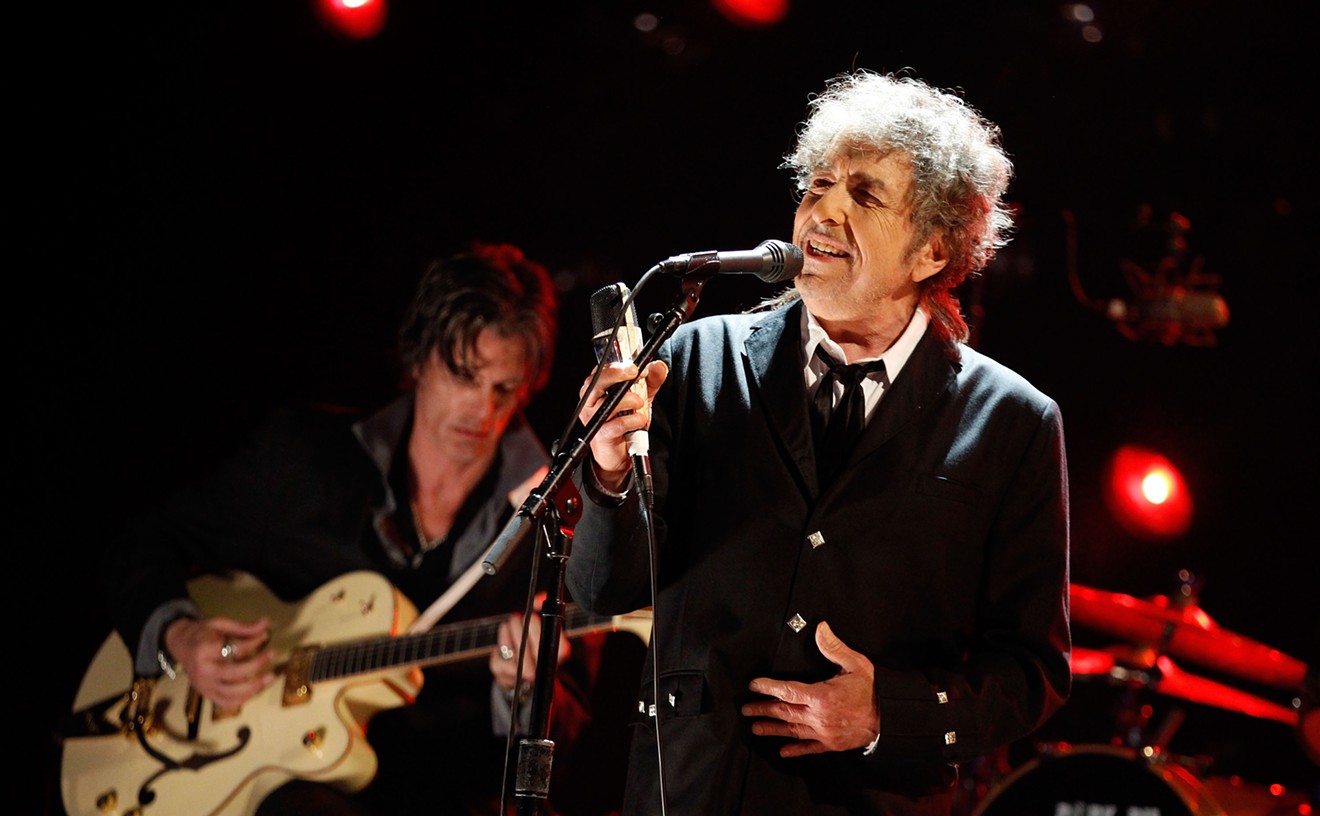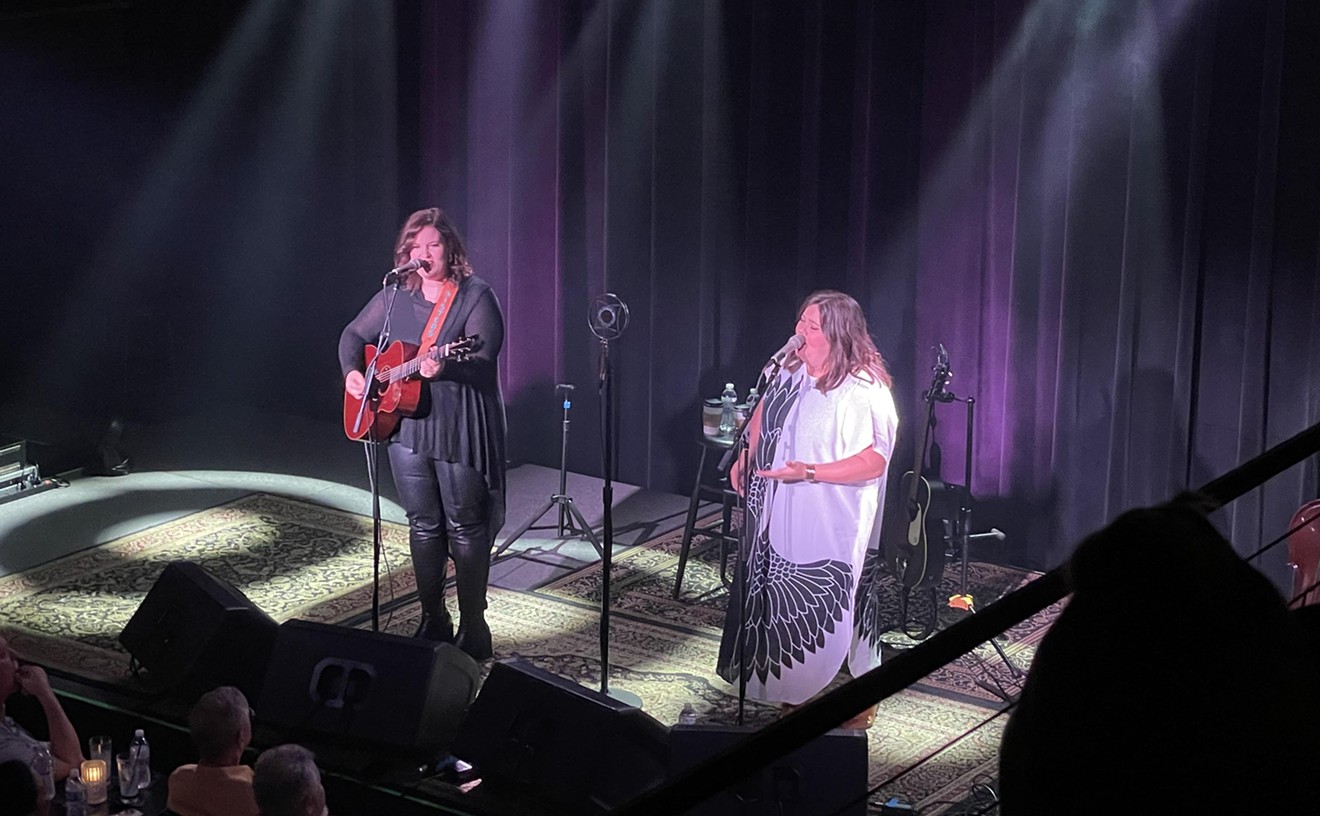We endeavored to learn more about this rising country star, who will play at the North Texas State Fair in Denton next week, and what we found is a pretty unusual success story. Johnson's last two albums have debuted at the top of the Billboard country albums charts — 2014's Cowboy Like Me debuted at No. 7 and last year's Gotta Be Me at No. 2 — all without the backing of a major label. He has six albums, and every one was self-released.
The 30-year-old's story begins in Sebastapol, a town of 500 near Hunstville, where he grew up. His dad played drums for their church, and after picking up that instrument, Johnson moved to guitar, to writing his own songs, and later to forming a band. He won some talent contests early on but initially chose to pursue a career as a bull rider instead of a musician.
In the early 2000s, after breaking numerous bones in the rodeo, Johnson began recording music, with his dad on drums. He sold CDs out of his car, played in local bars and clubs, and kept a job as a prison guard at the Texas State Penitentiary in Huntsville to pay the bills.
Over the last 10 years, he's gradually built a following. His career got a major boost after 2011's A Different Day, his first project with Nashville singer-songwriter Trent Willmon, who has become his producer.
When Johnson sings about the rodeo and his faith, there's an authenticity that is often missing from his contemporaries' music. His humble cowboy persona is not a persona at all. When you ask him about his recent success and what he's done to achieve it, he demurs, sounding a bit embarrassed.
So it must have been surreal when he showed up to the Houston Rodeo in March and, instead of mounting a bull, he climbed the stage to perform for more than 60,000 people. We asked Johnson about this and more earlier this week, when he called us from the road in San Francisco.
You're often compared to country musicians who ruled the radio in the '80s and the '90s, like George Strait and Garth Brooks. What do you think about the country music landscape today, and how do you want to influence it?
I try to keep my head out of the country music landscape, to be quite honest with you. I really do. I just try to concentrate on me and what I'm doing and make sure that I'm playing, first of all, songs that I believe in, that say things that I believe in, and to make sure that my live show is as good as I can possibly make it. I mean, that's our bread and butter. That's what we've always done.
I think it's really cool to hear, it's very honoring to hear comparisons to those artists because that's what influenced me. I think the way I want to influence this industry is to continue to do what I do. To continue to be myself. To not sign on the dotted line for all the glitz and glamor in the world. To just kind of say, "You know, no. That's OK. We're going to continue to make country music that we believe in."
And someday, that record label might come along. There might be a time and a place for all that, but right now, I think I'm just — my influence on the industry is just to continue to play music that I believe in, with music that I feel has meat and merit. You know, something to it. Something you can hold on to.
Well, you kind of led into my next question, which was about labels. It's pretty amazing that you've self-released all of your albums, and especially the last two have done incredibly well. Have you heard from major labels? And do they interest you, or is your attitude, "What I'm doing is working, so why do I even need them?"
We've been approached a lot. Sometimes it's been on our end, trying to get a record label, and it didn't work out. Sometimes, it was them coming and saying, "Really, we'd love to make this work," and the timing wasn't right. I really believe in praying about it and letting it go.
I just really didn't feel like that was the right decision this last time around with Gotta Be Me. As the world turns, that's become like a big staple part of this last album was people talking about how well it did do self-released, and I don't think it would've had that type of exposure with the label.
And like I say, the right business deal is the right business deal, but you never know when that may come down the road. But it just hasn't yet, and I'm thankful to have gotten as far as I have without all that. It's been a long, hard road.
Do you think that there's anything you've done differently that has really allowed that independent route to work for you? Is there anything in particular that you attribute your success to?
No. I don't ... I really don't. I really don't think about those kind of things. I really just think that I've tried to be obedient to the good Lord by saying, "All right. You put me on this path, and I'm going to do the best I can possibly do. I won't screw this up," and that's pretty much what it is.
I mean, every day that I get up and go to work, perfection is a goal — every time I strum my guitar, every time I write a song, every time I get onstage. Very rarely do I meet that expectation, so it always leaves me coming back the next day, wanting to do better. To sing better. To drive further. That's just kind of how I am. I think a lot of it comes down to plain old blue-collar work ethic.
A lot of people at the top of the charts right now were sort of plucked from obscurity and manufactured by record labels. Sometimes you hear they're struggling with fame because it's such a drastic lifestyle change. Your story is different. You've been playing, releasing albums and gradually building a following for 10 years. How hard or easy has it been for you to adapt to playing the Houston Rodeo or selling out Sam Houston Race Park?
The night after the Houston Rodeo, we flew to Kentucky, and we played in front of like 286 people. So night one, 61,000; the next night, 200 something. I had to look at my band and say, "All right, boys. This is where we figure out whether we're meant to do it."
In my opinion, and this is just my opinion, it's really easy to play in front of 60,000 people. It's really easy. The adrenaline is — if you live for it, like I do — the adrenaline is autopilot. You just get to enjoy it. What's harder is playing in front of 286 people because you have to look every one of those people in the eye. You have to manufacture that adrenaline. You have to manufacture that thing that comes so easy whenever you get that many people gathered into one place like Houston Rodeo or Sam Houston Race Park.
I was born to play. I feel like I was born to play in front of stadium crowds. That's just what I feel like my life's calling and my life's work would hopefully come to. But I do enjoy playing bars. I do enjoy playing theaters and stuff like that.
But all that being said, it has, over the last year and a half, been a completely huge lifestyle change in that my wife and I can't go out to eat anymore. It just turns into a really ... it's a fiasco. Normal things that we used to be able to do, like going to the grocery store or going on a date and stuff like that, that's no more because of the success that we've seen.
So at the rodeo, did you feel like you were really able to enjoy your own wedding, so to speak? Did you feel like you were really present and could soak up every moment?
Yes and no. I get into a zone whenever I'm on the stage that it does get a little blurry sometimes. I'll come offstage, and one of my band guys will go, "Hey, man. What about when such and such thing happened?" And I'll go, "When? When did that happen?" "Man, like five songs in." I'm like, "Oh, oh, oh. Yeah, yeah, yeah, yeah."
To me, it's like whenever I used to ride bulls. Some of my best rides, I didn't really remember a lot about because you just get so focused and so into the zone that it just kind of happens. You don't have to make it happen. It just happens.
Houston Rodeo, that was one of my best memories. But I played two songs at the Opry, and I barely remembered it because I was so worked up. Just two songs. The adrenaline of standing on that stage and then that crowd, a sold-out show at the Opry ... two songs, and it was gone. I just don't remember any of it, but I damn sure remember standing the next night after Houston Rodeo in Kentucky in front of that small amount of people going, "Man, this is not nearly as cool as Houston Rodeo. This is not nearly as cool. It's not going to be nearly as fun, but I'm going to have to do it because these people matter just as much."
They matter probably more because Houston is kind of where I'm from. That's my backyard. I should be able to have people in Houston. Where I shouldn't have people is in Kentucky or Lanesville or New York or Boston, so whenever you have those people, in my mind, I have to remind myself: "You put on a show for these people because they matter. They matter." It doesn't matter if there's 200; 20,000.
That's what I mean when you have to manufacture it. It's not fake. You just have to reach down into a different place and go, "All right, cowboy. It's time to deliver. You got to give them what they came for," and that's just part of it.
It's more about being a showman versus feeding off the energy that the audience is giving you to begin with.
Absolutely. That's where you have to dig down and go to work.
I understand things really changed for you in your career when you got hooked up with Nashville singer-songwriter Trent Willmon to produce your albums. How did that happen?
My manager, Howie Edelman, he used to actually sleep on Trent's couch a little bit whenever he first started working in Nashville with Tim Dubois, and Roger Creager, who is also managed by my manager, was good friends with Trent.
Long story short, I met my manager, Howie, through him. [He said,] "Man, you ought to check out this kid, Trent. You ought to check out this redheaded kid from Texas, man," and [he said,] "Yeah, sure. Bring him up. We'll write." In doing so, I met one of the best friends I've ever had in my life. Trent has, over the years, become my big brother. His family and my family are very, very close. We spend a lot of time together away from music, just getting away from it all.
But he wasn't a producer whenever I met him. He had talked about it. He had messed around with it. He'd produced some demos and some self-produced stuff, but nothing really to the magnitude of a number one iTunes chart album. I mean he didn't never see that in his future. He never thought, "Man. I want to be a producer," but the more and more we wrote and the more and more that he was in the studio with me when I was recording demos, he found his way. And then, he started producing other records and other people.
He has grown so much. The way that he used to think about a song or musical beats was very songwriter-ish. You know what I mean? Because you have to kind of wear several different hats when you're a producer. You have to be able to kind of be unbiased to a lot of things, and you have to be biased to some certain things. That's a hard thing to do. I trust him with everything I've got. He's my producer, and I wouldn't go to the studio with anybody else.
Gotta Be Me came out in August 2016, so not too long ago. Are you enjoying that right now, or are you already working on a new record?
We are starting to listen to songs. I used to say, "Well, I've written a bunch of songs, so let's record it." Not, "I've written the right songs." Now I've got 40 songs. I'm going to record 12 of them. You know what I mean?
Then it was, "Hey, man. This guy, Zane Williams, has got this song called 'Ride with Me.' Man, what do you think about recording somebody else's song?" At first I was like, "Oh, no. I didn't write it. I ain't recording it." That was a really stupid, young point of view.
Now, I'm so fortunate, so blessed that one of the guys that works for me, Scott Gunter, he's coming out this week in California, actually, with another thumb drive full of songs that are being pitched to us. People are calling us from Nashville saying, "Hey, here's three songs from my publishing company that we want to pitch to Cody Johnson for his next record." It just blows my mind.
You have to remember, too, that a lot of the country is just now getting ahold of Gotta Be Me. We're only in year one with it. Usually, about every two years or so is whenever you want to expect something from an artist. You go to Billings, Montana, and they know every single word to every single song on Gotta Be Me. They're just now on fire about this record up here.
How do you choose what you'll play for a particular audience? Do you play what you feel like playing that night, or are there more factors that come into consideration? Like, for example, for this gig in Denton next week, the North Texas State Fair, what will go into the decision about what you want to play?
I try to be respectful of all-ages crowds. We have songs like "Change," which is a Brothers Osbourne song that I got to cut on my last record. There's no other way of putting it, it's just about drinking. I mean the entire song is about just getting drunk. It's cool to play that in front of a bar crowd that you know that mom and daddy might not have brought their 12-year-old girl that wanted to see me, and it was the only place she could get in. You know what I mean? So I won't play some things.
On a different side, there's a lot of guitar changes. There's a lot of stage things that go on every night, that this song can't go next to this song because if you do, then it's going to put my fiddle player in a bind because he switches from his fiddle to his guitar or ... . There's a lot of factors that go into it. There's certain songs that are really great in our set that we've played over the years that really get a reaction, but when paired with this song and this song, they just die. That's just a trial-and-error thing.
Cody Johnson, North Texas State Fair and Rodeo, 9:30 p.m. Thursday, Aug. 24, 2217 N. Carroll Blvd., Denton, $15, ntfair.com.












